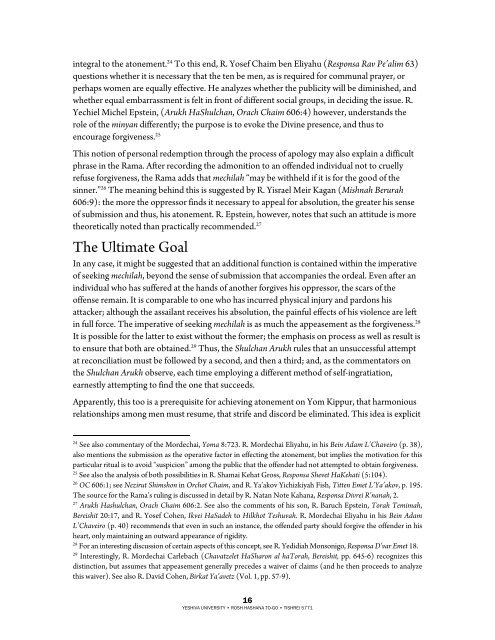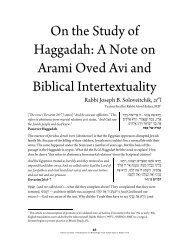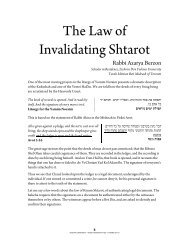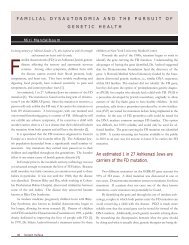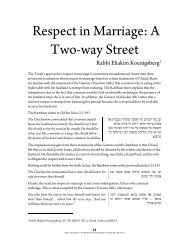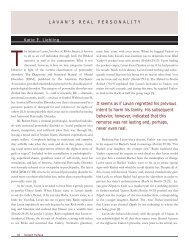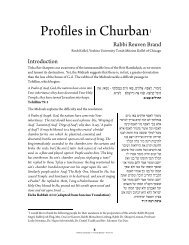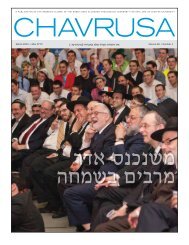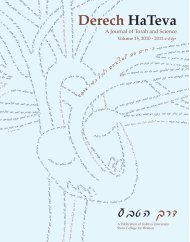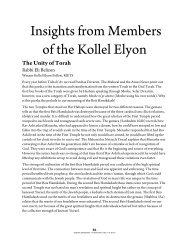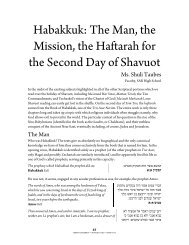YESHIVA UNIVERSITY • ROSH HASHANA TO-GO ... - YUTorah.org
YESHIVA UNIVERSITY • ROSH HASHANA TO-GO ... - YUTorah.org
YESHIVA UNIVERSITY • ROSH HASHANA TO-GO ... - YUTorah.org
Create successful ePaper yourself
Turn your PDF publications into a flip-book with our unique Google optimized e-Paper software.
integral to the atonement. 24 To this end, R. Yosef Chaim ben Eliyahu (Responsa Rav Pe’alim 63)<br />
questions whether it is necessary that the ten be men, as is required for communal prayer, or<br />
perhaps women are equally effective. He analyzes whether the publicity will be diminished, and<br />
whether equal embarrassment is felt in front of different social groups, in deciding the issue. R.<br />
Yechiel Michel Epstein, (Arukh HaShulchan, Orach Chaim 606:4) however, understands the<br />
role of the minyan differently; the purpose is to evoke the Divine presence, and thus to<br />
encourage f<strong>org</strong>iveness. 25<br />
This notion of personal redemption through the process of apology may also explain a difficult<br />
phrase in the Rama. After recording the admonition to an offended individual not to cruelly<br />
refuse f<strong>org</strong>iveness, the Rama adds that mechilah “may be withheld if it is for the good of the<br />
sinner.” 26 The meaning behind this is suggested by R. Yisrael Meir Kagan (Mishnah Berurah<br />
606:9): the more the oppressor finds it necessary to appeal for absolution, the greater his sense<br />
of submission and thus, his atonement. R. Epstein, however, notes that such an attitude is more<br />
theoretically noted than practically recommended. 27<br />
The Ultimate Goal<br />
In any case, it might be suggested that an additional function is contained within the imperative<br />
of seeking mechilah, beyond the sense of submission that accompanies the ordeal. Even after an<br />
individual who has suffered at the hands of another f<strong>org</strong>ives his oppressor, the scars of the<br />
offense remain. It is comparable to one who has incurred physical injury and pardons his<br />
attacker; although the assailant receives his absolution, the painful effects of his violence are left<br />
in full force. The imperative of seeking mechilah is as much the appeasement as the f<strong>org</strong>iveness. 28<br />
It is possible for the latter to exist without the former; the emphasis on process as well as result is<br />
to ensure that both are obtained. 29 Thus, the Shulchan Arukh rules that an unsuccessful attempt<br />
at reconciliation must be followed by a second, and then a third; and, as the commentators on<br />
the Shulchan Arukh observe, each time employing a different method of self-ingratiation,<br />
earnestly attempting to find the one that succeeds.<br />
Apparently, this too is a prerequisite for achieving atonement on Yom Kippur, that harmonious<br />
relationships among men must resume, that strife and discord be eliminated. This idea is explicit<br />
24 See also commentary of the Mordechai, Yoma 8:723. R. Mordechai Eliyahu, in his Bein Adam L’Chaveiro (p. 38),<br />
also mentions the submission as the operative factor in effecting the atonement, but implies the motivation for this<br />
particular ritual is to avoid “suspicion” among the public that the offender had not attempted to obtain f<strong>org</strong>iveness.<br />
25 See also the analysis of both possibilities in R. Shamai Kehat Gross, Responsa Shevet HaKehati (5:104).<br />
26 OC 606:1; see Nezirut Shimshon in Orchot Chaim, and R. Ya’akov Yichizkiyah Fish, Titten Emet L’Ya’akov, p. 195.<br />
The source for the Rama’s ruling is discussed in detail by R. Natan Note Kahana, Responsa Divrei R’nanah, 2.<br />
27 Arukh Hashulchan, Orach Chaim 606:2. See also the comments of his son, R. Baruch Epstein, Torah Temimah,<br />
Bereishit 20:17, and R. Yosef Cohen, Ikvei HaSadeh to Hilkhot Teshuvah. R. Mordechai Eliyahu in his Bein Adam<br />
L’Chaveiro (p. 40) recommends that even in such an instance, the offended party should f<strong>org</strong>ive the offender in his<br />
heart, only maintaining an outward appearance of rigidity.<br />
28 For an interesting discussion of certain aspects of this concept, see R. Yedidiah Monsonigo, Responsa D’var Emet 18.<br />
29 Interestingly, R. Mordechai Carlebach (Chavatzelet HaSharon al haTorah, Bereishit, pp. 645-6) recognizes this<br />
distinction, but assumes that appeasement generally precedes a waiver of claims (and he then proceeds to analyze<br />
this waiver). See also R. David Cohen, Birkat Ya’avetz (Vol. 1, pp. 57-9).<br />
16<br />
<strong>YESHIVA</strong> <strong>UNIVERSITY</strong> <strong>•</strong> <strong>ROSH</strong> <strong>HASHANA</strong> <strong>TO</strong>-<strong>GO</strong> <strong>•</strong> TISHREI 5771


